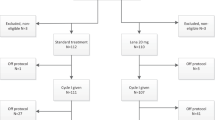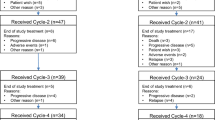Abstract
The treatment of older patients with acute myeloid leukaemia, who are not considered suitable for conventional intensive therapy, is unsatisfactory. Low-dose Ara-C(LDAC) has been established as superior to best supportive care, but only benefits the few patients who enter complete remission. Alternative or additional treatments are required to improve the situation. This randomised trial compared the addition of the immunoconjugate, gemtuzumab ozogamicin (GO), at a dose of 5 mg on day 1 of each course of LDAC, with the intention of improving the remission rate and consequently survival. Between June 2004 and June 2010, 495 patients entered the randomisation. The addition of GO significantly improved the remission rate (30% vs 17%; odds ratio(OR) 0.48 (0.32–0.73); P=0.006), but not the 12 month overall survival (25% vs 27%). The reason for the induction benefit failing to improve OS was two-fold: survival of patients in the LDAC arm who did not enter remission and survival after relapse were both superior in the LDAC arm. Although the addition of GO to LDAC doubled the remission rate it did not improve overall survival. Maintaining remission in older patients remains elusive.
This is a preview of subscription content, access via your institution
Access options
Subscribe to this journal
Receive 12 print issues and online access
$259.00 per year
only $21.58 per issue
Buy this article
- Purchase on Springer Link
- Instant access to full article PDF
Prices may be subject to local taxes which are calculated during checkout

Similar content being viewed by others
References
Walter RB, Othus M, Borthakur G, Ravandi F, Cortes-Franco JE, Pierce SA et al. Prediction of early death after induction therapy for newly diagnosed acute myeloid leukemia with pretreatment risk scores: a novel paradigm for treatment assignment. J Clin Oncol 2011; 29: 4417–4423.
Wheatley K, Burnett AK, Goldstone AH, Gray RG, Hann IM, Harrison CJ et al. A simple, robust, validated and highly predictive index for the determination of risk-directed therapy in acute myeloid leukaemia derived from the MRC AML 10 trial. Brit J Haematol 1999; 107: 69–79.
Sorror ML, Giralt S, Sandmaier BM, de Lima M, Shahjahan M, Maloney DG et al. Hematopoietic cell transplantation-specific comorbidity index as an outcome predictor for patients with acute myeloid leukemia in first remission: combined FHCRC and MDACC experiences. Blood 2007; 110: 4606–4613.
Giles FJ, Borthakur G, Ravandi F, Faderl S, Verstovsek S, Thomas D et al. The haematopoietic cell transplantation comorbidity index score is predictive of early death and survival in patients over 60 years of age receiving induction therapy for acute myeloid leukaemia. Br J Haematol 2007; 136: 624–627.
Krug U, Rollig C, Koschmieder A, Heinecke A, Sauerland MC, Schaich M et al. Complete remission and early death after intensive chemotherapy in patients aged 60 years or older with acute myeloid leukaemia: a web-based application for prediction of outcomes. Lancet 2011; 376: 2000–2008.
Juliusson G, Antunovic P, Derolf A, Lehman S, Mollgard L, Stockelberg D et al. Age and acute myeloid leukemia: real world data on decision to treat and outcomes from the Swedish Acute Leukemia Registry. Blood 2009; 113: 4179–4187.
Lowenberg B, Zittoun R, Kerkhofs H, Jehn U, Abels J, Debusscher L et al. On the value of intensive remission-induction chemotherapy in elderly patients of 65+ years with acute myeloid leukemia: a randomized phase III study of the European Organization for Research and Treatment of Cancer Leukemia Group. J Clin Oncol 1989; 7: 1268–1274.
Burnett AK, Milligan D, Goldstone A, Prentice A, McMullin MF, Dennis M et al. The impact of dose escalation and resistance modulation in older patients with acute myeloid leukaemia and high risk myelodysplastic syndrome: the results of the LRF AML14 trial. Br J Haematol 2009; 145: 318–332.
Burnett AK, Milligan D, Prentice AG, Goldstone AH, McMullin MF, Hills RK et al. A comparison of low-dose cytarabine and hydroxyurea with or without all-trans retinoic acid for acute myeloid leukemia and high-risk myelodysplastic syndrome in patients not considered fit for intensive treatment. Cancer 2007; 109: 1114–1124.
Kantarjian HM, Erba HP, Claxton D, Arellano M, Lyons RM, Kovascovics T et al. Phase II study of clofarabine monotherapy in previously untreated older adults with acute myeloid leukemia and unfavorable prognostic factors. J Clin Oncol 2010; 28: 549–555.
Burnett AK, Russell NH, Kell J, Dennis M, Milligan D, Paolini S et al. European development of clofarabine as treatment for older patients with acute myeloid leukemia considered unsuitable for intensive chemotherapy. J Clin Oncol 2010; 28: 2389–2395.
Hills RK, Burnett AK . Applicability of a ‘Pick a Winner’ trial design to acute myeloid leukemia. Blood 2011; 118: 2389–2394.
Sievers EL, Larson RA, Stadtmauer EA, Estey E, Lowenberg B, Dombret H et al. Efficacy and safety of gemtuzumab ozogamicin in patients with CD33-positive acute myeloid leukemia in first relapse. J Clin Oncol 2001; 19: 3244–3254.
Larson RA, Boogaerts MA, Estey E, Karanes C, Stadtmauer EA, Sievers EL et al. Antibody-targeted chemotherapy of older patients with acute myeloid leukemia in first relapse using Mylotarg (gemtuzumab ozogamicin). Leukemia 2002; 16: 1627–1636.
Giles F, Estey E, O’Brien S . Gemtuzumab ozogamicin in the treatment of acute myeloid leukemia. Cancer 2003; 98: 2095–2104.
Petersdorf S, Kopecky K, Stuart RK, Larson RA, Nevill TJ, Stenke L et al. Preliminary results of Southwest Oncology Group Study S0106: an international intergroup phase 3 randomized trial comparing the addition of Gemtuzumab Ozogamicin to standard induction therapy versus post-consolidation Gemtuzumab Ozogamicin versus no additional therapy for previously untreated Acute Myeloid Leukemia. Blood 2009; 114: 326–327, (Abstract).
Burnett AK, Hills RK, Milligan D, Kjeldsen L, Kell J, Russell NH et al. Identification of patients with Acute Myeloblastic Leukemia who benefit from the addition of Gemtuzumab Ozogamicin: Results of the MRC AML15 Trial. J Clin Oncol 2011; 29: 369–377.
Castaigne S, Pautas C, Terre C, Raffoux E, Bordessoule D, Bastie JN et al. Effect of gemtuzumab ozogamicin on survival of adult patients with de-novo acute myeloid leukaemia (ALFA-0701): a randomised, open-label, phase 3 study. Lancet 2012; 379: 1508–1516.
Burnett AK, Russell N, Hills RK, Kell J, Kjeldsen L, Hunter A et al. Addition of gemtuzumab ozogamicin to induction chemotherapy improves survival in older patients with acute myeloid leukemia. J Clin Oncol 2012; e-pub ahead of print 30 July 2012 doi:10.1200/JCO.2012.42.2964.
Cheson BD, Bennett JM, Kopecky KJ, Buchner T, Wilman CL, Estel EH et al. Revised recommendation of the International Working Group for diagnosis standardisation, of response criteria treatment outcomes and reporting standards for therapeutic trials in acute myeloid leukaemia. J Clin Oncol 2003; 21: 4642–4649.
Rizzieri D, LoRusso S, Tse W, Khan K, Advani A, Moore J et al. Phase I study of temozolomide and laromustine (VNP40101M) in patients with relapsed or refractory leukemia. Clin Lymphoma Myeloma Leuk 2010; 10: 211–216.
Fenaux P, Mufti GJ, Hellstrom-Lindberg E, Santini V, Gattermann N, Germing U et al. Azacitidine prolongs overall survival compared with conventional care regimens in elderly patients with low bone marrow blast count acute myeloid leukemia. J Clin Oncol 2010; 28: 562–569.
Kantarjian HM, Thomas XG, Dmoszynska A, Wierzbowska A, Mazur G, Mayer J et al. Multicenter, randomized, open-label, phase III trial of decitabine versus patient choice, with physician advice, of either supportive care or low-dose cytarabine for the treatment of older patients with newly diagnosed acute myeloid leukemia. J Clin Oncol 2012; 30: 2670–2677.
Fernandez HF, Sun Z, Yao X, Litzow MR, Luger SM, Paietta EM et al. Anthracycline dose intensification in acute myeloid leukemia. N Engl J Med 2009; 361: 1249–1259.
Lowenberg B, Ossenkoppele GJ, Putten W, Schouten HC, Graux C, Ferrant A et al. High-dose daunorubicin in older patients with acute myeloid leukemia. N Engl J Med 2009; 361: 1235–1248.
Acknowledgements
We are grateful to Wyeth for the provision of gemtuzumab ozogamicin, the Leukaemia Research Fund (now Leukaemia and Lymphoma Research) and Cancer Research UK for research funding, and also to the trial investigators, research colleagues and patients for supporting this investigation. The trial staff at the Birmingham Clinical Trials Unit performed the trial management activity.
Author information
Authors and Affiliations
Consortia
Corresponding author
Ethics declarations
Competing interests
AKB has served on advisory boards for Wyeth/Pfizer during the study. The remaining authors declare no conflict of interest.
Additional information
Supplementary Information accompanies the paper on the Leukemia website
Supplementary information
Rights and permissions
About this article
Cite this article
Burnett, A., Hills, R., Hunter, A. et al. The addition of gemtuzumab ozogamicin to low-dose Ara-C improves remission rate but does not significantly prolong survival in older patients with acute myeloid leukaemia: results from the LRF AML14 and NCRI AML16 pick-a-winner comparison. Leukemia 27, 75–81 (2013). https://doi.org/10.1038/leu.2012.229
Received:
Revised:
Accepted:
Published:
Issue Date:
DOI: https://doi.org/10.1038/leu.2012.229
Keywords
This article is cited by
-
Clinical evaluation of complete remission (CR) with partial hematologic recovery (CRh) in acute myeloid leukemia: a report of 7235 patients from seven cohorts
Leukemia (2024)
-
Venetoclax combined with low dose cytarabine compared to standard of care intensive chemotherapy for the treatment of favourable risk adult acute myeloid leukaemia (VICTOR): Study protocol for an international, open-label, multicentre, molecularly-guided randomised, phase II trial
BMC Cancer (2022)
-
Unified classification and risk-stratification in Acute Myeloid Leukemia
Nature Communications (2022)
-
Recent drug approvals for newly diagnosed acute myeloid leukemia: gifts or a Trojan horse?
Leukemia (2020)
-
Management of Acute Myeloid Leukemia (AML) in Older Patients
Current Oncology Reports (2020)



